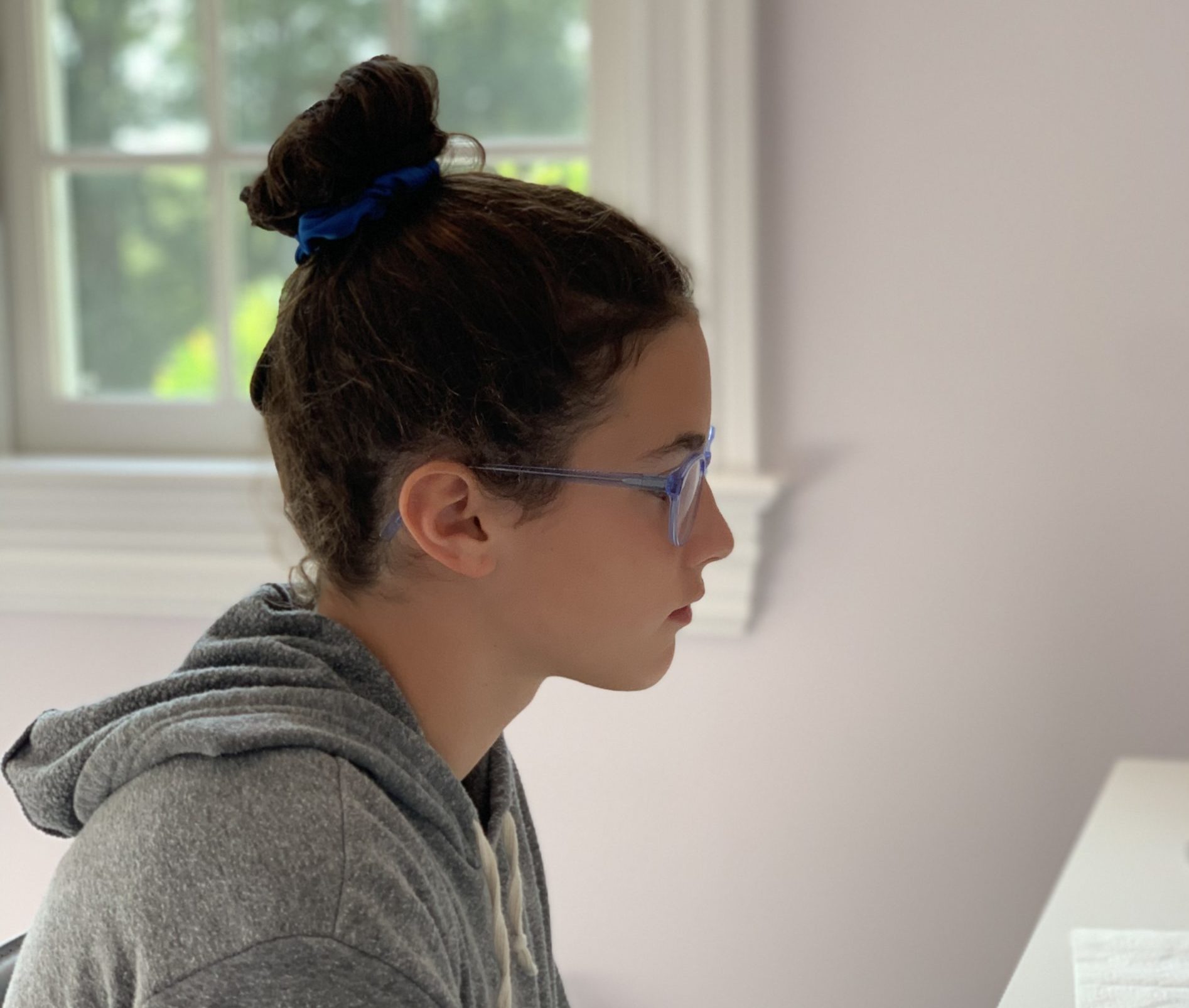Red, Red Wine blasted from the DJ’s speakers in the mauve hotel banquet room, the temporary parquet dance floor creaked under my one-inch patent leather heels as the peplum of my black and white polkadot dress swayed with the rhythm of the hypnotic chorus, “Red, red wine, stay close to me, Don’t let me be alone, It’s tearing apart my blue heart.” I was soaring toward the apex of 7th grade, the highlight of every bat mitzvah party: the climactic slow dance of the night. Bangs swept dramatically to one side, my wide, brace-filled smile shimmered in the flash of the lone strobe light as I looked down at my dance partner, a solid 3 inches shorter than I was, and I thought: 7th grade couldn’t get much better than this magical moment. And, in fact, I was right. It wouldn’t. In the months that followed the apex of that Red Red Wine slow dance, friendships forged, broke up and bonded again, my science fair project bombed, my 7th grade love affair lasted no more than seven days, and by spring, with a dramatic flourish, I was accused by my English teacher of plagiarizing my term paper on Romeo & Juliet. (The paper, by the way, was entirely my own work and once I was exonerated, I was quite flattered that my ideas were so good my teacher thought I’d cheated.)
Seventh grade was a year of exhilarating highs and painful lows. Feeling a part of things some days (long, late night phone calls) and feeling like an outsider other days (excluded from a sleepover), feeling beautiful one moment (cue black polkadot dress) and feeling awful the next (cue Guess jeans that wouldn’t zip), embracing my burgeoning identity on a Sunday evening (really into Simon & Garfunkel now) and feeling ashamed of it by Monday afternoon (cool kids only listen to Top 40). I can hardly recall a year of my life that felt so high-stakes, so tumultuous, so luminescent in both its anguish and its exhilaration.
It is the eve of my daughter’s 7th Grade year, in the corona-age no less, and I have been grappling with what advice I want to impart to her ahead of this momentous time. In my opinion, there are very few personal eras so deep, so primal, so central to one’s identity, for good and for bad, as being a Seventh Grader. And so, on the precipice of this seminal moment, I am desperate to offer my daughter the kind of wisdom that, God willing, she will give to her own daughter in 30 years, saying to her something like: “I’m going to share with you the magical and brilliant advice my incredible mother gave to me when I started 7th Grade. It changed my life.” Realistic to hope for such an achievement? Not at all. Worth trying for this wisdom even if it makes no difference to her? For sure. Will this advice protect her from the roller coaster of being 12-years-old? Definitely not. Can I help her feel that she is not alone in whatever she will go through? Absolutely.
So I sat down to write this shimmering piece of sagacity that will set my daughter on the path toward uncomplicated joy, fulfillment and confidence this year, and my mind went blank. Not because she won’t need me this year, but rather, because I realized, what I DON’T say and what I DON’T do is actually more important this year than what I actually say and do. The words I hold back from staying, the stories I decide not to tell, the advice I choose not to share, the space I leave for her to talk may actually be the best thing I can offer my daughter on her 7th Grade roller coaster. So instead of deciding exactly what words I will use, what profound wisdom I will self-consciously foist upon my daughter, I’ve come up with five guiding principles for being there for my daughter this year, principles that embrace the philosophy that sometimes what we don’t say is just as important as what we do:
- First and foremost: I am NOT GOING TO DUMP MY 7TH GRADE SHIT ON MY DAUGHTER. Even though it feels like it was YESTERDAY, I have already had my 7th Grade year. Now it is my daughter’s turn and it is hard enough to be this age without carrying your parents’ baggage along with your own experiences on the journey. Before I share a personal story from that time, I will think long and hard about whether the story is additive or a burden for my daughter, whether it is more useful for me to share it or more useful for her to hear it.
- I am not going to tell my daughter to “calm down” or label her emotional outbreaks as “dramatic” or “overreactions” even if I find them deeply irritating and extremely inconvenient. I am going to allow her the full range of emotions that her psychological and physical development dictate are normal and healthy. If she gets used to having her emotions belittled at this age, it may take her 30 years to realize that it is her right to have whatever emotion she is feeling even it is inconvenient to someone else. (Side note: I will set boundaries about how she is allowed to treat me or other family members while she is having these big feelings because disrespect is never ok.)
- I am going to take a golden nugget of advice from the Raising Good Humans Podcast in which Dr. Aliza Pressman suggest asking: “Do you want me to just listen or do you want my advice?” Which essentially says to my kid that I am available in whatever way feels most helpful to her: as a passively supportive presence or an active helper to sort through what she’s experiencing. Here’s the important part of this framing — I’m NOT the one who will decide how the conversation will go, she is, and therefore she gains agency in a situation in which she may currently feel powerless. (Side note, in either situation I may use prompts like, “How did you feel when…” to help her develop an analysis and grow her emotional vocabulary beyond mad, sad or frustrated.)
- I AM NOT GOING TO COMMENT ON HER BODY, ON HER WEIGHT, ON HER BREASTS, ON HER BODY HAIR. I will make sure she understands what is happening or will be happening with her body through conversation, books and videos but I will wait for her to bring up questions or ask for my guidance about different issues. This is a time of incredible body change and development, some of which she may be aware and some of which she may not. SHE DOES NOT NEED MY JUDGMENT OR MY BAGGAGE. She does need my LOVE, my SUPPORT and my HELP learning to make healthy choices about food, exercise and hygiene.
- Last but not least — I am going to hold her when she cries. I am going to sit quietly while she shouts. I am going to laugh with her when she laughs. Because more than anything else, this year my daughter needs an ally, a champion and a bolster if she is feeling confused or lonely or unsure. I am going going to keep her company for the magical and sometimes difficult journey they call 7th Grade.
P.S. Here is some of the beautiful and empowering advice I received from other people for my daughter. It is proof that even when we feel we are most alone, in 7th Grade or otherwise, there are folks who believe in us and who are cheering us on.
Laugh at all the ridiculous things – that are even funnier when no one but you and your besties get it.
You’ve got this! Be kind and be you!
Don’t be afraid to still act like a kid sometimes! Also wear deodorant.
Be kind to others, accept and love yourself as your body and mind change, always carry extra period supplies—someone will always need them!
Be brave, be you!
“What rises to the top in 7th grade is often not what rises to the top in life.” Stay true to yourself – you are a superstar!
Don’t wing it the first time you shave your legs. Get a lesson from an adult who can spare you the skinned shins! (I might be speaking from experience.)
Just know that no matter how intense some of the relationships and situations you experience are, in a few years they will (on the whole) not even be something you remember.







